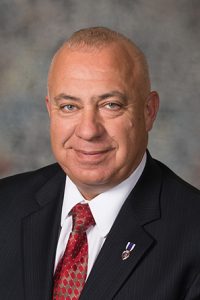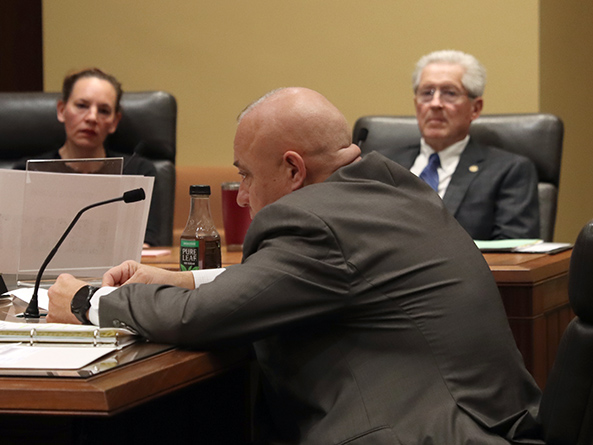Additional school firearm exemptions discussed
School districts could authorize security personnel and off-duty law enforcement to carry firearms on school grounds and at school-sponsored activities under a proposal considered Feb. 6 by the Education Committee.

LB1339, introduced by Gordon Sen. Tom Brewer, would broaden an exemption in state law regarding who can legally carry a firearm on Nebraska school property. The bill would add off-duty and qualified retired law enforcement officers to the current exemption.
Under the bill, school districts also could voluntarily establish a written policy to authorize security personnel to carry firearms. The policy must address qualifications, training, firearms, ammunition and use of force.
Finally, LB1339 would provide grants from the School Safety and Security Fund to create high-resolution school facility maps for emergency response agencies. The bill offers parameters for such maps to ensure interoperability with coordinating agencies.
Brewer said rural parts of Nebraska have difficulty hiring law enforcement. As a result, law enforcement response can be as much as 30 minutes in some parts of the state, he said, hindering their ability to respond promptly to a violent attack. LB1339 would provide those school districts with a way to protect their students, he said.
“Here’s the bottom line — as a Legislature, we command parents to take their kids to school,” Brewer said. “That means that we need to make it possible to protect them while they are at school.”
Patrick Dempsy testified in support of LB1339 on behalf of the Omaha Police Officers Association. He said that allowing law enforcement to carry firearms on school grounds shows a commitment to protecting Nebraska children, teachers and school staff.
“In an era where unforeseen threats can manifest in the most unexpected ways, immediate response capabilities of armed officers becomes paramount,” Dempsey said.
Representing the Nebraska State Volunteer Firefighters Association, Jerry Stilmock also testified in support of the measure. Providing maps of schools to emergency response agencies would ensure responders know where to go and when action is needed, he said.
“The more we know ahead of time, the better we are able to prepare,” Stilmock said.
Also testifying in support of the measure was Patricia Harrold, representing the Nebraska Firearms Owners Association. She said the only variable that can reduce casualties during an act of violence is time — and response time should be seconds, not minutes.
“Whether it’s recognizing the threat, calling 911, having the police arrive — that is a luxury of time that we cannot afford,” Harrold said.
Jennifer Hodge of Omaha, a member of Moms Demand Action, spoke in opposition to the measure. Putting more guns in schools will not decrease shootings, she said, but rather increase the risk of the accidental shooting of bystanders and children who find or steal a firearm on school grounds.
Instead of allowing firearms on school grounds, Hodge said, Nebraska should implement extreme risk protection laws, ban assault weapons or raise the age to purchase a firearm to reduce the risk of shootings.
Kyle McGowan testified against LB1339, speaking on behalf of the Nebraska Council of School Administrators. The definition of firearm in the bill is broad, he said, and Nebraska school administrators would like to see it tightened to ensure that weapons such as assault rifles are not allowed on school grounds.
“Safety is always part of our goal in schools, and introducing deadly weapons into the building requires a whole other level of oversight and caution,” McGowan said.
Representing the Nebraska State Education Association, Tim Royers also testified in opposition to the bill. Research shows armed guards do not reduce shootings, he said, and rates of death in schools with armed security are 2.83% higher than those without.
In 2011, Royers said he was a teacher at Millard South High School when a school shooting occurred. After the shooting took place, teachers requested updates to doors so that they could be locked from inside the classroom and the tightening of building entry protocols, he said.
“I’ve never had an educator ask for armed staff, but I have had plenty of them tell me that a provision like [LB1339] would drive them out of the profession,” Royers said.
The committee took no immediate action on the proposal.


